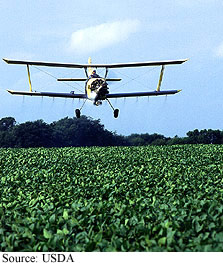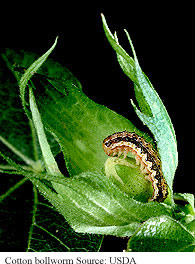 |
||||||||||||
 Organic
Farming:
Organic
Farming:
Bt proteins has been used in many organic farms for over 50 years as a microbial pest control agent (MCPA). Bt proteins are allowed in organic farming as a insecticide because Bt is a natural, non-pathogenic bacterium that is found naturally in the soil. Bt has also been found to be safe to all higher animals tested.
Bt strains account for nearly 90% of the world MPCA market. Most of the Bt products contain insecticidal crystal proteins (ICP) and viable spores (spores that can produce live bacteria). The ICPs are responsible for insect toxicity. ICPs are usually biologically inactive within hours or days. A few products contain inactivated spores.
 Typical
agricultural formulations include wettable powders, spray concentrates,
liquid concentrates, dusts, baits, and time release rings. Bt
formulations may be applied to foliage, soil, water environments or food
storage facilities. There are many different strains of Bt used,
each specific to different insects. Because Bt is species specific,
beneficial and non-target insects are usually not harmed.
Typical
agricultural formulations include wettable powders, spray concentrates,
liquid concentrates, dusts, baits, and time release rings. Bt
formulations may be applied to foliage, soil, water environments or food
storage facilities. There are many different strains of Bt used,
each specific to different insects. Because Bt is species specific,
beneficial and non-target insects are usually not harmed.
Popular Bt Strains used
| Bt Strain | Effective against |
| Bt kurstaki (Btk) | types of lepidopterous insects gypsy moth cabbage looper |
| Bt aizawai (Bta) | wax moth larvae in honeycombs |
| Bt israelensis (Bti) | mosquitoes, blackflies, midges |
| Bt san diego | certain beetle species, bool weevil |
 Bt
is effective only when eaten by the insect as a larva, Bt is
ineffective against most adult insects. Since Bt is applied topically,
insects that attack the roots or the insides of a plant will not be affected.
Bt
is effective only when eaten by the insect as a larva, Bt is
ineffective against most adult insects. Since Bt is applied topically,
insects that attack the roots or the insides of a plant will not be affected.